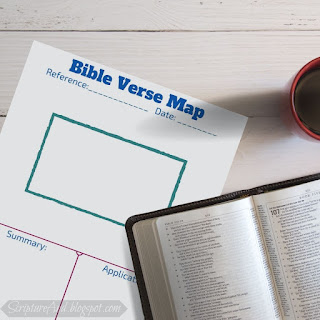Bible Word Study Printable
This is the second in a series of printable Bible Study resources. We have already covered how to make observations on Bible verses. Now, we will look at how to study one specific word. The twist is that we will look at the word in the original Hebrew or Greek. You do not need to know Hebrew or Greek to do this. You just need some resources. Thankfully, these resources are all available online if you don't have them already in your home.
Choosing a Word
To begin, choose the word in your verse you want to study. This can be a result of the observations that were made on the Bible verse or it could be a word you were curious about. What words shouldn't you pick? Pronouns, articles, and most prepositions (don't use you, he, the, a, of, in...). First of all, these words are used far too many times to study each occurrence. Second, you probably won't learn much from studying these words, because their meaning is already firmly established. Third, you will probably not find these words in Strong's Concordance, the resource that we will use.
Finding the Hebrew or Greek Words and Its Occurences
Now that you have chosen the word you are studying in your verse, copy the verse on the Word Study printable in the space provided and underline or highlight the word you are studying. Then, look up the Hebrew (Old Testament) or Greek (New Testament) word by looking it up in the Strong's Concordance. There are two ways to do this: the old-fashioned way and the modern way. Both work just as well, but the modern way is easier. I will describe the modern way first.
The modern way to find the Hebrew or Greek word is to use a Bible app or online Bible that has the Strong's numbers. Logos, Olive Tree, Accordance, Blue Letter Bible, and other apps can do this. I am going to show you how to do it for free online. First, go to biblestudytools.com online. Then, search for the Bible verse you are studying in the box at the top of the page, but be sure to choose KJV or NASB for the translation as these are the only ones indexed using Strong's Concordance on their website. Once you pull up the Bible verse, notice that some of the words of the verse are in blue. If there are no blue words, click on the gear on the right side above the Bible verse and check the box for Strongs Numbers. Then click on the word you want to study. If the word is not in blue, then the word is not indexed on Strongs or it is actually part of another word (try clicking on a nearby word). Clicking on the word will pull up an entry for the Hebrew or Greek word. There you will find the transliterated word (the Hebrew or Greek word in English letters), the definition, how it was translated, the origin of the word, and a list of the books of the Bible that the word is in (click on the books to see individual verses). You will have to click on all of these things to find the information needed for the printable.
The old-fashioned way is to use a physical copy of Strong's Concordance. Look up the English word and find the verse you are looking for underneath it. This will give you the Strong's number for the Hebrew/Greek word. Then, you can look up the Strong's number and find the Hebrew or Greek word, including its origin and the different ways it is translated. Then look up each of the ways that it is translated and find all of the Bible verses that have that Strong's number for each of those ways.
Analyzing the Uses of the Word
Now comes the actual Bible study part. Take notes about how the word is used in each Bible verse that it occurs. Is it used the same way each time? Is there an overarching theme for all the uses? Are there multiple ways that the word is used? Do any uses stand out? For example, did you find that the word for "fall short" in Romans 3:23 is used as "lack" in many other places? Did you see that word used for God's grace being "lavished" on us in Ephesians 1:8 is the same word used for the bread that was "leftover" after the feeding of the 5,000? Once you see all of the meanings, decide how you think the word was used in your Bible verse. Make comments on any insights you had in the conclusions section.
Practice
Practice completing a word study on the word bore (bare, carried, or brought... depending on the translation) in 1 Peter 2:24. You can find my example of this word study here.






Comments
Post a Comment